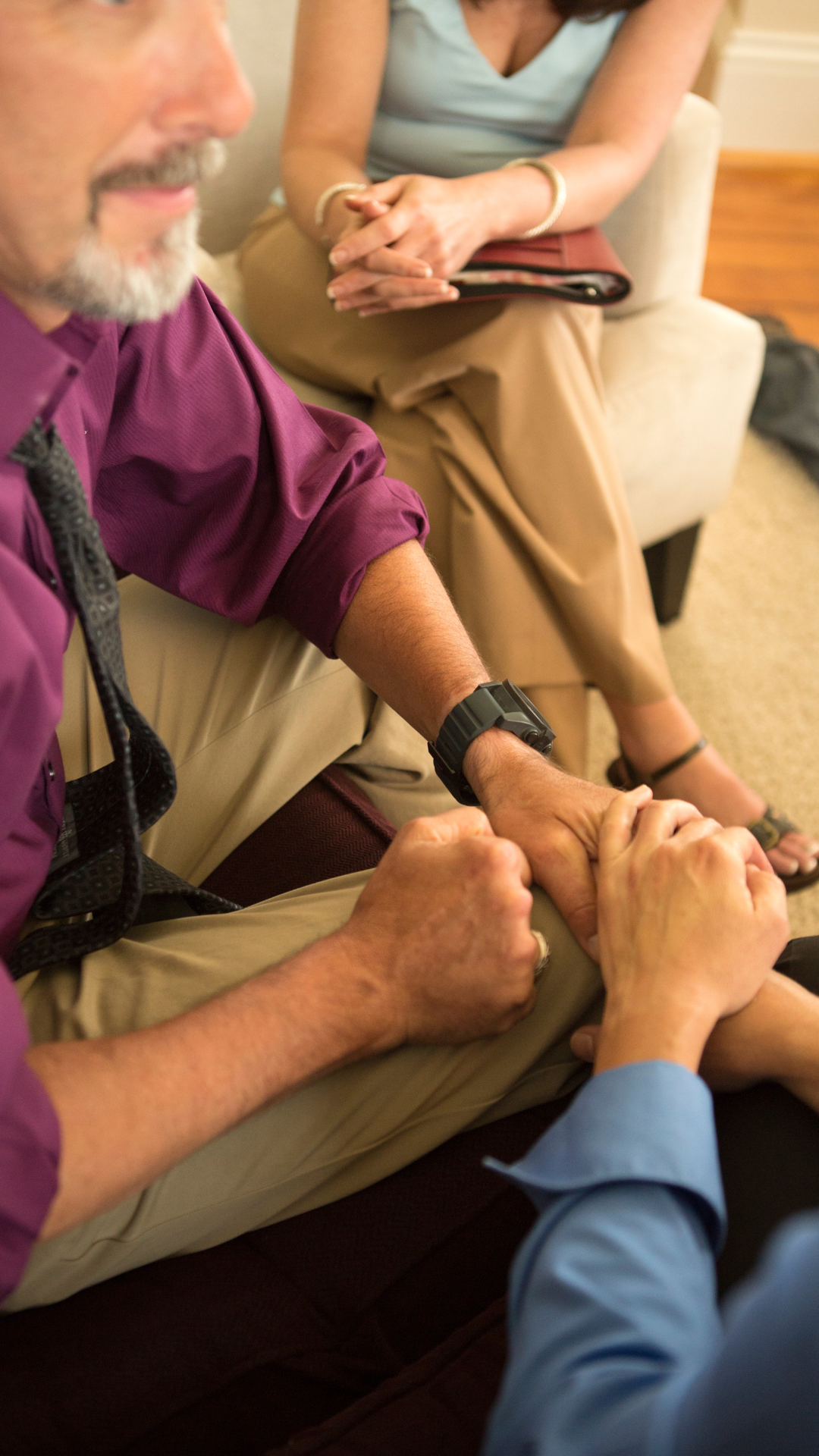Understanding & Navigating Grief Counseling
Comprehensive Guide to Grief Counseling
Comprehensive Guide to Grief Counseling
Loss is something everyone faces, and yet each experience of grief is uniquely personal. When you lose someone or something significant, you may find that the path through grief feels isolating, confusing, or overwhelming. It’s important to remember there’s no right or wrong way to mourn—grief is not a linear process. For those seeking comfort and support, grief counseling offers a compassionate space to process these emotions, rediscover hope, and continue moving forward. In this guide, you’ll find a clear overview of what grief counseling is, who it can help, and how to take the next steps toward healing.

What is Grief Counseling?
Grief counseling, sometimes called bereavement therapy, is a specialized form of therapy that helps individuals, families, and groups cope with any significant loss. Guided by a trained therapist, you are invited to explore a wide range of emotions—such as sadness, anger, guilt, and confusion—in a supportive environment.
Rather than trying to erase your pain, grief counseling empowers you to understand and integrate loss into your life. Accordingly, you are offered a safe, non-judgmental setting to express your feelings, honor your loved one, and discover new coping skills for the road ahead.

The Many Benefits of Professional Support
Why Consider Grief Counseling?
Choosing to access grief counseling is a courageous, compassionate act of self-care. As you walk through this process, you can benefit in many ways:
A Safe Space to Grieve:
Share your deepest emotions with someone who will listen without judgment or pressure.
Understanding the Grieving Process:
Discover how your reactions are unique, valid, and a natural part of healing.
Developing Healthy Coping Skills:
Learn practical strategies for navigating sadness, honoring anniversaries, and facing everyday triggers.
Addressing Complicated Grief:
If your pain feels unrelenting or overwhelming, counseling can offer targeted support for more intense or prolonged grief.
Strengthening Connections:
Family counseling can help everyone feel understood and united, even when grieving styles differ.
Reconnecting with Life:
By working with a therapist, you can gradually find new meaning, rebuild connections, and honor your loss while moving forward.
Common Challenges Grief Counseling Can Help With
It’s common to wonder if your feelings “qualify” for support. In fact, people seek grief counseling for a wide variety of reasons, and all experiences are welcome. Some challenges that often bring people to therapy include:
- Intense Sadness or Depression:
Experiencing ongoing emptiness or hopelessness. - Anger and Resentment:
Feeling anger towards yourself, others, or even the person who’s gone. - Guilt and Regret:
Struggling with “what ifs” or unfinished conversations. - Heightened Anxiety or Fear:
Worrying about the future or your wellbeing. - Social Withdrawal:
Avoiding friends or family and losing interest in things you used to enjoy. - Identity Struggles:
Feeling unsure about who you are after your loss. - Family Friction:
Navigating conflicts that can arise when family members grieve in different ways. - Coping with Traumatic Loss:
Facing the complex pain of sudden or unexpected loss.
If any of these resonate with you or your family, it may be helpful to explore counseling as a supportive next step.

How Grief Therapy Can Support Your Healing
What to Expect in the Counseling Process
Beginning therapy may feel daunting, but it’s designed to be flexible and responsive to your needs. Here’s how grief counseling usually unfolds:
Creating a Safe Environment
First and foremost, your therapist will help you feel comfortable sharing your story. This early stage honors whatever you are feeling, offering validation and understanding.
Exploring Coping Strategies
Next, you and your therapist will work on building coping skills. This might include ways to handle intense emotions, take care of yourself, or navigate challenging anniversaries and dates. Many find it helpful to learn how to commemorate loved ones while also taking small steps toward re-engagement with life.
Finding a New Normal
Finally, as you progress, therapy can help you integrate your loss as part of your life story. This doesn’t mean forgetting—it means learning how to move forward with a sense of hope and possibility, even while holding space for your grief.
Therapy Approaches to Grief
Therapy Approaches to Grief Counseling
Finding the right approach to grief counseling is a deeply personal process. Each individual’s needs and experiences are different, which is why therapists often use a variety of evidence-based methods to help you navigate loss. Here are some common therapeutic approaches you might encounter:
Cognitive Behavioral Therapy (CBT)
CBT is widely used in grief counseling to help individuals recognize and reframe unhelpful patterns of thinking and behavior that may be making grief harder to bear. For example, if you struggle with guilt or self-criticism, CBT can offer tools to challenge those thoughts and develop healthier self-talk.
Group Therapy
Group therapy provides a supportive environment where people can share their stories and learn from one another. Being part of a group often reminds participants they are not alone in their struggles and can foster a sense of connection, understanding, and mutual encouragement during the healing process.
Mindfulness and Relaxation Techniques
Mindfulness practices, such as guided meditation, deep breathing, and progressive muscle relaxation, can help you stay grounded when emotions feel overwhelming. These techniques teach you to be present with your feelings in a nonjudgmental way, which often brings relief and increases resilience over time.
Narrative Therapy
This approach centers on telling your story in a safe space, allowing you to process your loss through meaning-making and personal reflection. By exploring the relationship you had with your loved one and the impact of their loss, narrative therapy can help honor memories and find comfort.
Family and Couples Therapy
Sometimes, loss affects entire families or relationships. Inclusive therapies for couples or families can help everyone involved express their feelings, navigate different grieving styles, and strengthen emotional support systems together.
No matter which path you follow, a compassionate therapist will work collaboratively with you to determine which methods best meet your needs. Support can be customized, ensuring you never have to navigate grief alone.
How to Support a Grieving Loved One
Supporting a loved one through grief can sometimes feel overwhelming, especially when you want to help but aren’t sure what to say or do. Grieving is a deeply personal experience, and every individual processes loss in their own way. Here are some compassionate, practical steps you can take to provide meaningful support:
- Listen Without Judgment: Offer a safe space for the bereaved person to share their feelings. Sometimes the most powerful thing you can do is simply listen without offering solutions or trying to change how they feel.
- Acknowledge Their Pain: Let them know that it’s okay to grieve, and that their feelings—however complex—are valid.
- Be Patient and Present: Grief has no timeline. Continue to check in, even after the initial aftermath, and let them set the pace for conversations and activities.
- Offer Practical Help: Everyday tasks can feel overwhelming when someone is grieving. Offering to help with meals, childcare, errands, or daily chores can be a true relief.
- Respect Their Process: Don’t push them to “move on” or compare their experience with others’. Honor their unique way and timeline for grieving.
- Encourage Seeking Support: Gently remind them that reaching out for professional grief counseling or joining a support group is an act of strength and self-care, never a sign of weakness.
- Take Care of Yourself: Supporting someone through grief can be emotionally demanding. Make sure you also seek support if you need it, so you can provide care with authenticity and resilience.
Remember, your presence and willingness to stand alongside someone in their grief can offer immense comfort—even if you don’t always know what to say.
FAQs About Grief Counseling
Frequently Asked Questions (FAQs) About Grief Counseling
Here are answers to questions many people have as they consider whether grief counseling is right for them.
Is My Grief “Bad Enough” for Counseling?
There is no minimum requirement to seek help. If your loss is impacting your well-being or daily life in any way, support is available. All grief is worthy of care, and seeking help shows strength, not weakness.
How Long Will Grief Counseling Last?
Everyone’s journey is unique. Some individuals and families may benefit after just a few sessions, while others need longer-term support. Your therapist will work with you to create a timeline and plan tailored to your comfort and progress.
What If My Family Members Grieve Differently Than I Do?
Differences in grieving styles are normal. One person may wish to talk, another may stay silent. These differences can lead to misunderstandings or tension. Family grief counseling can help everyone feel seen, fostering connection even through disagreement.
Can Counseling Help with Non-Death Losses?
Absolutely. Loss takes many forms—not only through death, but also through changes like divorce, job loss, or the passing of a beloved pet. Every kind of loss is respected and welcomed in counseling.
Will My Sessions Be Confidential?
Yes. A strong foundation of confidentiality allows you to speak openly and honestly in your sessions. Your therapist will review any legal boundaries to confidentiality (such as risk of harm) during your first meeting.
How Can I Start Grief Counseling?
Taking that first step is often the hardest, but you don’t have to do it alone. You can contact Maplewood Counseling to schedule an initial consultation and begin your journey toward healing. This session is a safe space for you to share your story and ask any questions you may have about the process. We are here to support you, every step of the way.
If you or someone you care about is struggling with grief, please remember that hope and help are always available. You do not need to navigate this path alone.
When to Consider Grief Counseling
It’s not always easy to know when to reach out for help during times of loss. Grieving is unique for every individual, but there are certain signs and situations that suggest you might benefit from professional support. Consider seeking grief counseling if:
- Your sadness or pain feels overwhelming and doesn’t seem to lessen with time.
- Grief is interfering with your ability to function at home, work, or in relationships.
- You’re isolating yourself from loved ones or losing interest in activities you once enjoyed.
- You experience persistent feelings of guilt, anger, hopelessness, or self-doubt.
- Managing daily tasks feels exhausting or unmanageable.
- You are struggling to cope with sudden, traumatic, or multiple losses.
- You find it difficult to talk with others about your feelings, or you sense a lack of understanding or support in your network.
- You notice unhealthy coping strategies, such as substance use or risky behaviors.
Choosing to seek counseling is a courageous step—one that shows you value your well-being and are open to support and guidance. If you ever experience thoughts of self-harm or feel truly stuck in your grief, don’t hesitate to reach out for help. You don’t have to navigate this journey alone; support is available to help you find hope and healing.
Grief Resources for Maplewood Counseling
Helpful Resources for Grief and Loss
- Grief affects everyone differently—give yourself permission to experience your feelings without judgment or comparison.
- Allow yourself time and space to mourn; there is no set timeline or “right” way to grieve.
- Reach out to supportive friends, family, or community groups when you’re ready—connection can bring comfort.
- Engage in activities that nurture you, such as gentle exercise, creative expression, or time in nature.
- Honor the memory of your loved one in ways that feel meaningful to you—this might include rituals, storytelling, or creating a remembrance.
- Keep a journal to process difficult emotions and notice gradual changes in how you feel over time.
- Practice self-compassion and recognize moments of progress, no matter how small they may seem.
- Try to maintain healthy routines, including sleep, nutrition, and self-care, as much as possible.
- If you find daily functioning too difficult or if intense emotions persist, consider reaching out for professional grief support.

Making the decision to ask for support is often the most challenging part, yet it is a powerful affirmation of hope. You don’t have to navigate this journey by yourself.
When you feel prepared to embrace healing and find renewed purpose and happiness in your life, we are here to walk alongside you. Contact Maplewood Counseling to book a consultation and take the first step on your path to recovery.
Helpful Blog Articles
Shared Vision for Interfaith & Interracial Families | Maplewood
Creating a Shared Vision for Interfaith and...
Therapy for Interfaith & Interracial Couples in NJ
How Therapy Can Support Interfaith and...
Communication Tips for Culturally Diverse Couples
Communication Tips for Culturally Diverse...
Helpful Resources
- Understanding Anxiety: Learn how therapy can help manage anxiety.
- Grief Counseling: Support for processing loss and navigating grief.
- Individual Therapy: Personalized support for managing depression and stress.
- Guide to Self-Esteem: Build confidence and self-worth.
- Trauma-Informed Therapy: Support for healing from past trauma.






